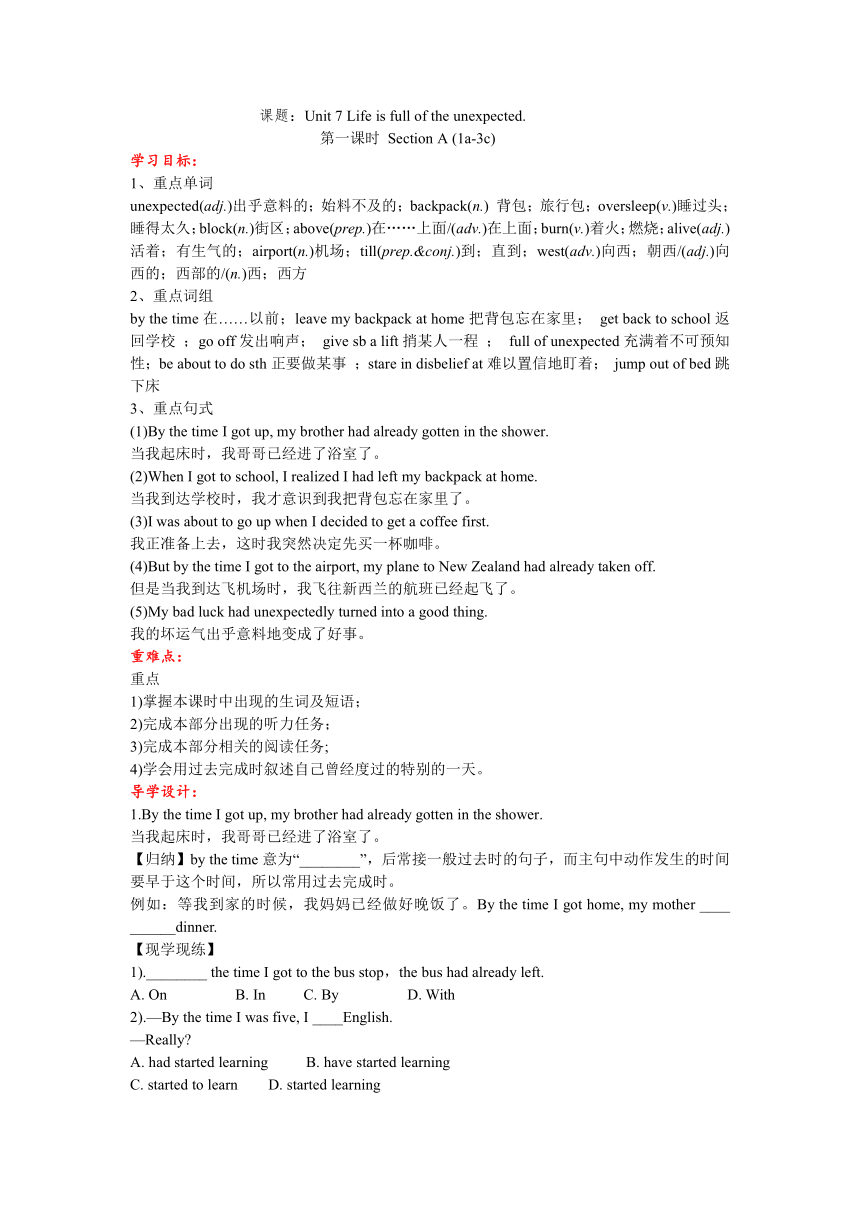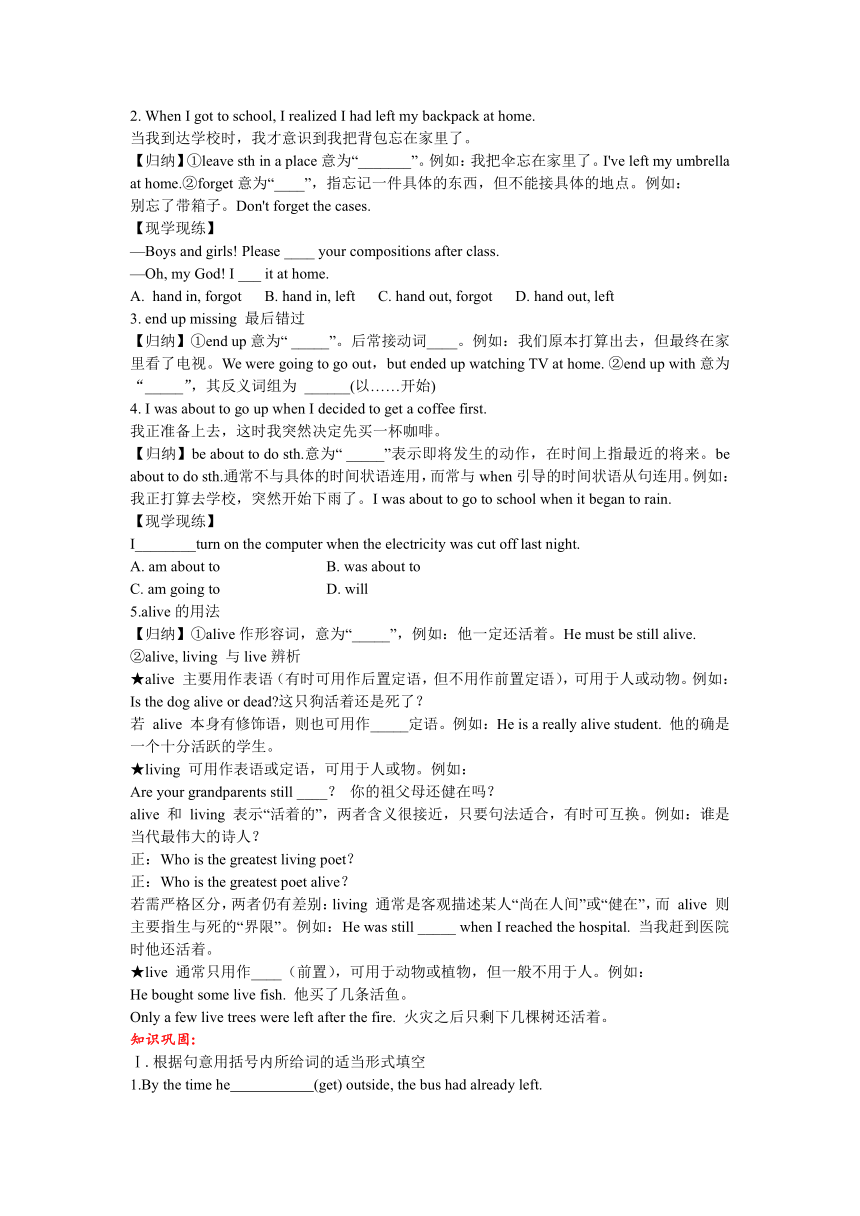Unit 7 Life is full of the unexpected Section A(1a-3c)学案 (含答案)
文档属性
| 名称 | Unit 7 Life is full of the unexpected Section A(1a-3c)学案 (含答案) |

|
|
| 格式 | doc | ||
| 文件大小 | 45.5KB | ||
| 资源类型 | 教案 | ||
| 版本资源 | 鲁教版 | ||
| 科目 | 英语 | ||
| 更新时间 | 2022-11-06 12:15:56 | ||
图片预览


文档简介
课题:Unit 7 Life is full of the unexpected.
第一课时 Section A (1a-3c)
学习目标:
1、重点单词
unexpected(adj.)出乎意料的;始料不及的;backpack(n.) 背包;旅行包;oversleep(v.)睡过头;睡得太久;block(n.)街区;above(prep.)在……上面/(adv.)在上面;burn(v.)着火;燃烧;alive(adj.)活着;有生气的;airport(n.)机场;till(prep.&conj.)到;直到;west(adv.)向西;朝西/(adj.)向西的;西部的/(n.)西;西方
2、重点词组
by the time在……以前;leave my backpack at home把背包忘在家里; get back to school返回学校 ;go off发出响声; give sb a lift捎某人一程 ; full of unexpected充满着不可预知性;be about to do sth正要做某事 ;stare in disbelief at难以置信地盯着; jump out of bed跳下床
3、重点句式
(1)By the time I got up, my brother had already gotten in the shower.
当我起床时,我哥哥已经进了浴室了。
(2)When I got to school, I realized I had left my backpack at home.
当我到达学校时,我才意识到我把背包忘在家里了。
(3)I was about to go up when I decided to get a coffee first.
我正准备上去,这时我突然决定先买一杯咖啡。
(4)But by the time I got to the airport, my plane to New Zealand had already taken off.
但是当我到达飞机场时,我飞往新西兰的航班已经起飞了。
(5)My bad luck had unexpectedly turned into a good thing.
我的坏运气出乎意料地变成了好事。
重难点:
重点
1)掌握本课时中出现的生词及短语;
2)完成本部分出现的听力任务;
3)完成本部分相关的阅读任务;
4)学会用过去完成时叙述自己曾经度过的特别的一天。
导学设计:
1.By the time I got up, my brother had already gotten in the shower.
当我起床时,我哥哥已经进了浴室了。
【归纳】by the time意为“________”,后常接一般过去时的句子,而主句中动作发生的时间要早于这个时间,所以常用过去完成时。
例如:等我到家的时候,我妈妈已经做好晚饭了。By the time I got home, my mother ____ ______dinner.
【现学现练】
1).________ the time I got to the bus stop,the bus had already left.
A. On B. In C. By D. With
2).—By the time I was five, I ____English.
—Really
A. had started learning B. have started learning
C. started to learn D. started learning
2. When I got to school, I realized I had left my backpack at home.
当我到达学校时,我才意识到我把背包忘在家里了。
【归纳】①leave sth in a place意为“_______”。例如:我把伞忘在家里了。I've left my umbrella at home.②forget意为“____”,指忘记一件具体的东西,但不能接具体的地点。例如:
别忘了带箱子。Don't forget the cases.
【现学现练】
—Boys and girls! Please ____ your compositions after class.
—Oh, my God! I ___ it at home.
A. hand in, forgot B. hand in, left C. hand out, forgot D. hand out, left
3. end up missing 最后错过
【归纳】①end up意为“ _____”。后常接动词____。例如:我们原本打算出去,但最终在家里看了电视。We were going to go out,but ended up watching TV at home. ②end up with意为“_____”,其反义词组为 ______(以……开始)
4. I was about to go up when I decided to get a coffee first.
我正准备上去,这时我突然决定先买一杯咖啡。
【归纳】be about to do sth.意为“ _____”表示即将发生的动作,在时间上指最近的将来。be about to do sth.通常不与具体的时间状语连用,而常与when引导的时间状语从句连用。例如:我正打算去学校,突然开始下雨了。I was about to go to school when it began to rain.
【现学现练】
I________turn on the computer when the electricity was cut off last night.
A. am about to B. was about to
C. am going to D. will
5.alive的用法
【归纳】①alive作形容词,意为“_____”,例如:他一定还活着。He must be still alive.
②alive, living 与live辨析
★alive 主要用作表语(有时可用作后置定语,但不用作前置定语),可用于人或动物。例如:Is the dog alive or dead 这只狗活着还是死了?
若 alive 本身有修饰语,则也可用作_____定语。例如:He is a really alive student. 他的确是一个十分活跃的学生。
★living 可用作表语或定语,可用于人或物。例如:
Are your grandparents still ____? 你的祖父母还健在吗?
alive 和 living 表示“活着的”,两者含义很接近,只要句法适合,有时可互换。例如:谁是当代最伟大的诗人?
正:Who is the greatest living poet?
正:Who is the greatest poet alive?
若需严格区分,两者仍有差别:living 通常是客观描述某人“尚在人间”或“健在”,而 alive 则主要指生与死的“界限”。例如:He was still _____ when I reached the hospital. 当我赶到医院时他还活着。
★live 通常只用作____(前置),可用于动物或植物,但一般不用于人。例如:
He bought some live fish. 他买了几条活鱼。
Only a few live trees were left after the fire. 火灾之后只剩下几棵树还活着。
知识巩固:
Ⅰ.根据句意用括号内所给词的适当形式填空
1.By the time he (get) outside, the bus had already left.
2. She said that she (see) the movie already.
3.They kept (stand) outside the room during the whole meeting.
4. (luck), she was at home when I called.
5.The box is full of (knife).
6.The teacher stared at the boy _________(run) on the playground.
7.He ran out of the __________(burn) building.
8.Is he _______(live) or dead
9.The plane is about to ______(take) off.
10.His father is an office ________(work).
Ⅱ.单项选择
1.It’s cold outside. Please _____ your coat when you go out.
A.put on B.dress C.wear D.in
2._____ the time I got outside,my mother had left.
A.When B.At C.From D.By
3.I _____ my English book was in my schoolbag, but in fact I _____ it at home.
A.remember;forget B.think;left
C.thought;left D.remembered;forgot
4.— Did you see Bob at the meeting
— No, he _____ by the time I got there.
A.left B.has left C.had left D.was leaving
5.There were lots of people at the street corner when the accident ______.
A.took place B.has happened
C.was happened D.happened
Ⅲ.根据对话内容,从方框中选择恰当的选项补全对话,其中有两项多余。
A: Hi, Sally.You look very unhappy.What's wrong
B: Hi, Bob. 1. ____________
A: What happened
B: This morning I got up late.When I got to the bus stop, the bus had left. 2. ____________
A: Oh, you had to wait for about 20 minutes.
B: Yes, and on the way I found that I had left my keys at home.
A: 3.____________
B: Right.And when I got to school, I found my classmates weren't at school.They had gone to help clean up the City Park. But I forgot we were going to do that.
A: 4. _____________
B: Yes, and I had to stay at school the whole morning.When I had a physics class in the afternoon, I found that I had forgotten to bring my physics homework.
A: That' too bad. 5. ___________
B: OK, I will.
A. But you couldn't go back home again.B. So you returned home to get your keys C. So you missed the chance to be a volunteer D. But I like to be a volunteer.E. You should be more careful next time.F. I've had a really bad day.G. So I had to wait for another bus.
参考答案
导学设计
1.到……的时候/在……以前,had cooked【现学现练】1).C 2).A
2. ① 把某物忘在某处,遗忘某物【现学现练】B
3. ①最终成为/最后处于, ing形式②以……结束,begin with
4.刚要做某事/即将做某事【现学现练】B
5. ①活着/有生气的②前置,living, alive,定语
知识巩固
Ⅰ.1. got 2.had seen 3. standing 4.Luckily 5. knives 6.running 7.burning 8.alive 9.take 10.worker
Ⅱ.1-5 ADCCD
Ⅲ.1-5 FGBCE
第一课时 Section A (1a-3c)
学习目标:
1、重点单词
unexpected(adj.)出乎意料的;始料不及的;backpack(n.) 背包;旅行包;oversleep(v.)睡过头;睡得太久;block(n.)街区;above(prep.)在……上面/(adv.)在上面;burn(v.)着火;燃烧;alive(adj.)活着;有生气的;airport(n.)机场;till(prep.&conj.)到;直到;west(adv.)向西;朝西/(adj.)向西的;西部的/(n.)西;西方
2、重点词组
by the time在……以前;leave my backpack at home把背包忘在家里; get back to school返回学校 ;go off发出响声; give sb a lift捎某人一程 ; full of unexpected充满着不可预知性;be about to do sth正要做某事 ;stare in disbelief at难以置信地盯着; jump out of bed跳下床
3、重点句式
(1)By the time I got up, my brother had already gotten in the shower.
当我起床时,我哥哥已经进了浴室了。
(2)When I got to school, I realized I had left my backpack at home.
当我到达学校时,我才意识到我把背包忘在家里了。
(3)I was about to go up when I decided to get a coffee first.
我正准备上去,这时我突然决定先买一杯咖啡。
(4)But by the time I got to the airport, my plane to New Zealand had already taken off.
但是当我到达飞机场时,我飞往新西兰的航班已经起飞了。
(5)My bad luck had unexpectedly turned into a good thing.
我的坏运气出乎意料地变成了好事。
重难点:
重点
1)掌握本课时中出现的生词及短语;
2)完成本部分出现的听力任务;
3)完成本部分相关的阅读任务;
4)学会用过去完成时叙述自己曾经度过的特别的一天。
导学设计:
1.By the time I got up, my brother had already gotten in the shower.
当我起床时,我哥哥已经进了浴室了。
【归纳】by the time意为“________”,后常接一般过去时的句子,而主句中动作发生的时间要早于这个时间,所以常用过去完成时。
例如:等我到家的时候,我妈妈已经做好晚饭了。By the time I got home, my mother ____ ______dinner.
【现学现练】
1).________ the time I got to the bus stop,the bus had already left.
A. On B. In C. By D. With
2).—By the time I was five, I ____English.
—Really
A. had started learning B. have started learning
C. started to learn D. started learning
2. When I got to school, I realized I had left my backpack at home.
当我到达学校时,我才意识到我把背包忘在家里了。
【归纳】①leave sth in a place意为“_______”。例如:我把伞忘在家里了。I've left my umbrella at home.②forget意为“____”,指忘记一件具体的东西,但不能接具体的地点。例如:
别忘了带箱子。Don't forget the cases.
【现学现练】
—Boys and girls! Please ____ your compositions after class.
—Oh, my God! I ___ it at home.
A. hand in, forgot B. hand in, left C. hand out, forgot D. hand out, left
3. end up missing 最后错过
【归纳】①end up意为“ _____”。后常接动词____。例如:我们原本打算出去,但最终在家里看了电视。We were going to go out,but ended up watching TV at home. ②end up with意为“_____”,其反义词组为 ______(以……开始)
4. I was about to go up when I decided to get a coffee first.
我正准备上去,这时我突然决定先买一杯咖啡。
【归纳】be about to do sth.意为“ _____”表示即将发生的动作,在时间上指最近的将来。be about to do sth.通常不与具体的时间状语连用,而常与when引导的时间状语从句连用。例如:我正打算去学校,突然开始下雨了。I was about to go to school when it began to rain.
【现学现练】
I________turn on the computer when the electricity was cut off last night.
A. am about to B. was about to
C. am going to D. will
5.alive的用法
【归纳】①alive作形容词,意为“_____”,例如:他一定还活着。He must be still alive.
②alive, living 与live辨析
★alive 主要用作表语(有时可用作后置定语,但不用作前置定语),可用于人或动物。例如:Is the dog alive or dead 这只狗活着还是死了?
若 alive 本身有修饰语,则也可用作_____定语。例如:He is a really alive student. 他的确是一个十分活跃的学生。
★living 可用作表语或定语,可用于人或物。例如:
Are your grandparents still ____? 你的祖父母还健在吗?
alive 和 living 表示“活着的”,两者含义很接近,只要句法适合,有时可互换。例如:谁是当代最伟大的诗人?
正:Who is the greatest living poet?
正:Who is the greatest poet alive?
若需严格区分,两者仍有差别:living 通常是客观描述某人“尚在人间”或“健在”,而 alive 则主要指生与死的“界限”。例如:He was still _____ when I reached the hospital. 当我赶到医院时他还活着。
★live 通常只用作____(前置),可用于动物或植物,但一般不用于人。例如:
He bought some live fish. 他买了几条活鱼。
Only a few live trees were left after the fire. 火灾之后只剩下几棵树还活着。
知识巩固:
Ⅰ.根据句意用括号内所给词的适当形式填空
1.By the time he (get) outside, the bus had already left.
2. She said that she (see) the movie already.
3.They kept (stand) outside the room during the whole meeting.
4. (luck), she was at home when I called.
5.The box is full of (knife).
6.The teacher stared at the boy _________(run) on the playground.
7.He ran out of the __________(burn) building.
8.Is he _______(live) or dead
9.The plane is about to ______(take) off.
10.His father is an office ________(work).
Ⅱ.单项选择
1.It’s cold outside. Please _____ your coat when you go out.
A.put on B.dress C.wear D.in
2._____ the time I got outside,my mother had left.
A.When B.At C.From D.By
3.I _____ my English book was in my schoolbag, but in fact I _____ it at home.
A.remember;forget B.think;left
C.thought;left D.remembered;forgot
4.— Did you see Bob at the meeting
— No, he _____ by the time I got there.
A.left B.has left C.had left D.was leaving
5.There were lots of people at the street corner when the accident ______.
A.took place B.has happened
C.was happened D.happened
Ⅲ.根据对话内容,从方框中选择恰当的选项补全对话,其中有两项多余。
A: Hi, Sally.You look very unhappy.What's wrong
B: Hi, Bob. 1. ____________
A: What happened
B: This morning I got up late.When I got to the bus stop, the bus had left. 2. ____________
A: Oh, you had to wait for about 20 minutes.
B: Yes, and on the way I found that I had left my keys at home.
A: 3.____________
B: Right.And when I got to school, I found my classmates weren't at school.They had gone to help clean up the City Park. But I forgot we were going to do that.
A: 4. _____________
B: Yes, and I had to stay at school the whole morning.When I had a physics class in the afternoon, I found that I had forgotten to bring my physics homework.
A: That' too bad. 5. ___________
B: OK, I will.
A. But you couldn't go back home again.B. So you returned home to get your keys C. So you missed the chance to be a volunteer D. But I like to be a volunteer.E. You should be more careful next time.F. I've had a really bad day.G. So I had to wait for another bus.
参考答案
导学设计
1.到……的时候/在……以前,had cooked【现学现练】1).C 2).A
2. ① 把某物忘在某处,遗忘某物【现学现练】B
3. ①最终成为/最后处于, ing形式②以……结束,begin with
4.刚要做某事/即将做某事【现学现练】B
5. ①活着/有生气的②前置,living, alive,定语
知识巩固
Ⅰ.1. got 2.had seen 3. standing 4.Luckily 5. knives 6.running 7.burning 8.alive 9.take 10.worker
Ⅱ.1-5 ADCCD
Ⅲ.1-5 FGBCE
同课章节目录
- Unit 1 When was it invented?
- Section A
- Section B
- Unit 2 Teenagers should be allowed to choose their
- Section A
- Section B
- Unit 3 It must belong to Carla.
- Section A
- Section B
- Unit 4 I like music that I can dance to.
- Section A
- Section B
- Unit 5 You’re supposed to shake hands.
- Section A
- Section B
- Unit 6 Sad movies make me cry.
- Section A
- Section B
- Unit 7 Life is full of the unexpected.
- Section A
- Section B
- Unit 8 We're trying to save the earth!
- Section A
- Section B
- Unit 9 It's important to have good habits.
- Section A
- Section B
- Unit 10 I remember meeting all of you in Grade 6.
- Section A
- Section B
